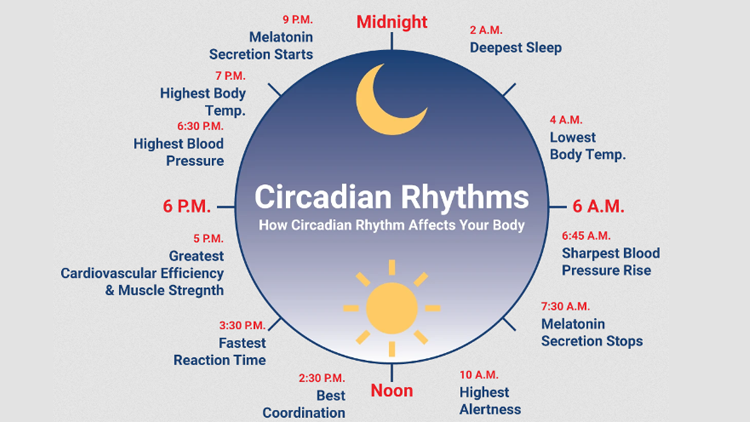
Introduction
The human body operates on a natural 24-hour cycle known as the circadian rhythm. This internal clock regulates various bodily functions, including sleep-wake cycles, hormone production, and metabolism. Understanding the importance of maintaining a healthy circadian rhythm is crucial for optimal health and overall well-being. In this article, we will explore the significance of circadian rhythm in different bodily functions, the negative impact of disrupted rhythms, the benefits of delaying school start times, the importance of prioritizing sleep, and the role of time-restricted feeding and exposure to natural light in promoting good sleep and overall health.
Understanding Circadian Rhythm
Circadian rhythm is the natural, internal process regulating the sleep-wake cycle and other bodily functions. External cues, such as light and darkness primarily influence it. The brain’s suprachiasmatic nucleus (SCN) serves as the body’s master clock, coordinating various biological processes throughout the day. When the circadian rhythm is in sync, it promotes optimal health and well-being.
The Importance of Circadian Rhythm in Bodily Functions
Circadian rhythm is crucial in various bodily functions, including the immune response, metabolism, and brain health and repair processes.
Immune Response
A well-functioning circadian rhythm plays a vital role in the proper functioning of the immune system. Research has shown that circadian clocks exist within immune cells, influencing their activity and response to pathogens. Disruptions to the circadian rhythm can weaken the immune system, making individuals more susceptible to infections and diseases.
Metabolism
Circadian rhythm also affects metabolism and energy regulation. It influences the release of hormones such as insulin, crucial in blood sugar control. Disruptions to the circadian rhythm can lead to metabolic imbalances, increasing the risk of obesity, diabetes, and cardiovascular disease.
Brain Health and Repair
During sleep, the brain undergoes crucial processes for repair and regeneration. Circadian rhythm influences the quality and duration of sleep, affecting cognitive function, memory consolidation, and overall brain health. A disrupted circadian rhythm has been linked to an increased risk of neurodegenerative diseases like Alzheimer’s.
The Impact of Shift Work and Disrupted Circadian Rhythm on Health
Shift work, characterized by irregular work hours and disrupted sleep patterns, can harm health. Prolonged exposure to shift work has been associated with an increased risk of various health issues, including cancer. Disruptions to the circadian rhythm caused by irregular sleep-wake patterns can lead to hormonal imbalances and impaired cellular repair processes, potentially contributing to the development of cancer and other chronic diseases.
The Benefits of Delaying School Start Times
Delaying school start times can significantly benefit students’ health and academic performance.
Improvements in Student Health
Research suggests that delaying school start times can positively impact student’s health. Adolescents often experience a shift in their circadian rhythm, leading to delayed sleep phase syndrome. By aligning school schedules with the natural sleep patterns of teenagers, students can obtain adequate sleep, reducing the risk of sleep deprivation-related health issues.
Enhancing Academic Performance
Improved sleep resulting from delayed school start times has been shown to enhance academic performance. Students who get sufficient sleep are more alert, focused, and better equipped to retain information. By allowing students to optimize their sleep, delayed school start times can contribute to better educational outcomes.
The Significance of Prioritizing Sleep and Managing Sleep Debt
Sleep debt accumulates when individuals consistently get less sleep than their body needs. This chronic sleep deprivation can have severe consequences for physical and mental health. Prioritizing sleep and ensuring adequate restful sleep each night is essential for overall well-being. By adopting healthy sleep habits, individuals can reduce sleep debt and improve their overall health and cognitive function.
Time-Restricted Feeding: A Positive Impact on Sleep Quality and Health
Time-restricted feeding is an eating pattern limiting the daily eating window, usually 8-12 hours. This approach aligns eating patterns with the body’s natural circadian rhythm, allowing for better digestion and metabolism regulation. Research suggests that time-restricted feeding can positively impact sleep quality and overall health by optimizing the body’s internal clock and hormonal balance.
Exposure to Natural Light: Enhancing Sleep and Overall Well-being
Exposure to natural light, particularly in the morning, helps regulate the circadian rhythm. Natural light acts as a cue for the body, signaling the start of the day and promoting wakefulness. By incorporating outdoor activities and maximizing exposure to natural light, individuals can improve their sleep quality, mood, and overall well-being.
Conclusion
Circadian rhythm is a crucial factor in maintaining optimal health and well-being. It affects various bodily functions, including the immune response, metabolism, brain health, and repair processes. Disruptions to the circadian rhythm, such as those caused by shift work or irregular sleep patterns, can have negative health outcomes. However, individuals can optimize their sleep quality and overall health by understanding the importance of circadian rhythm, delaying school start times, prioritizing sleep, and implementing lifestyle practices like time-restricted feeding and exposure to natural light.
























